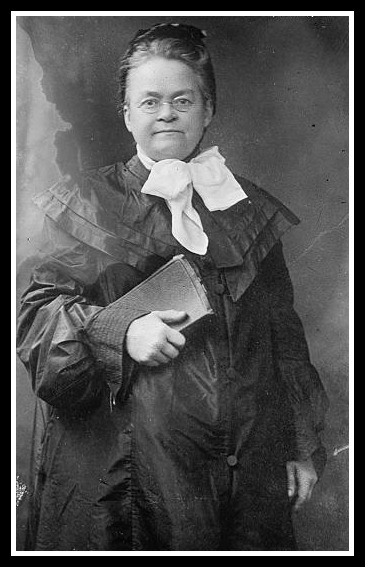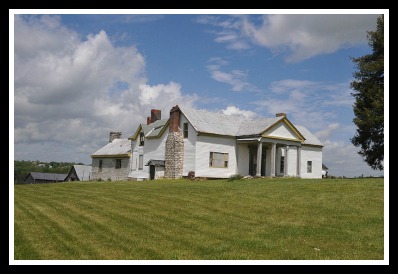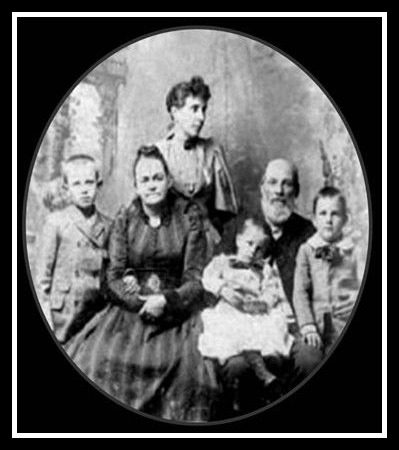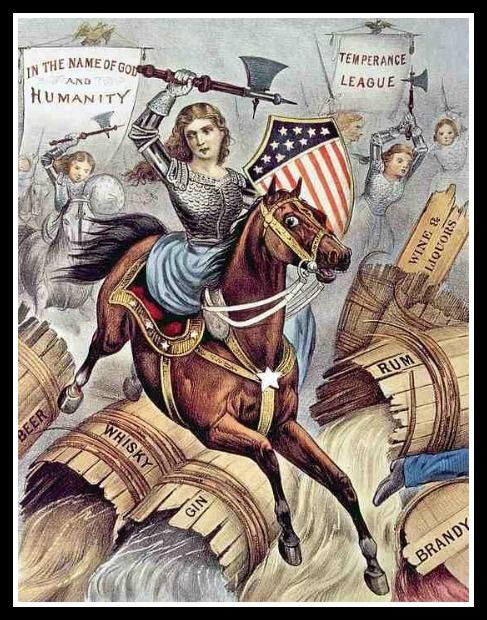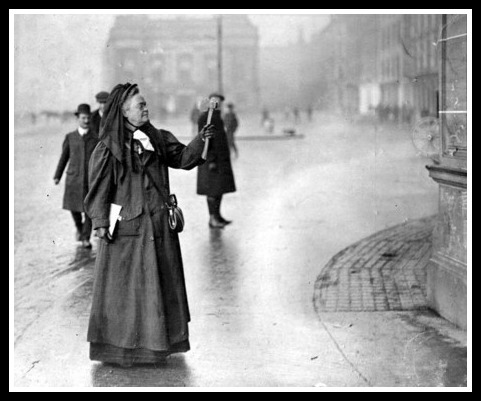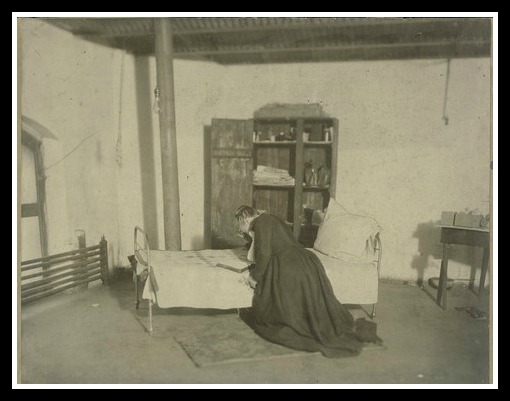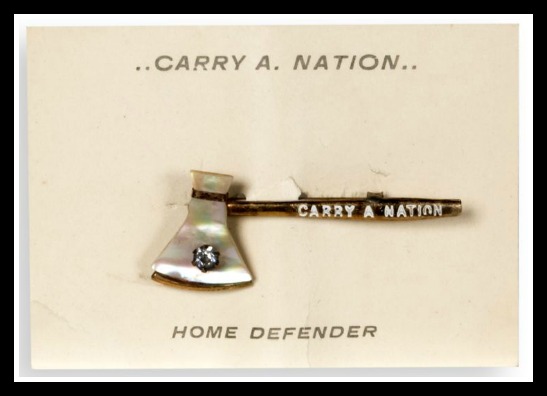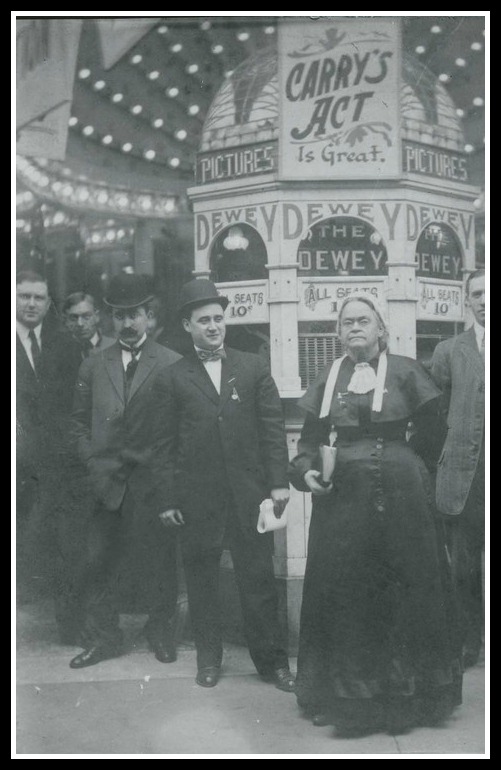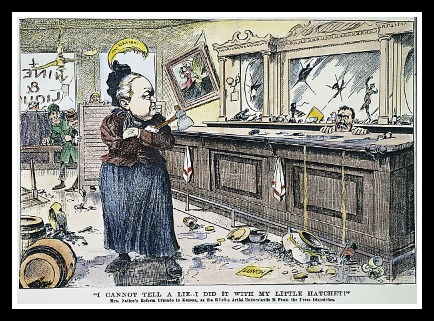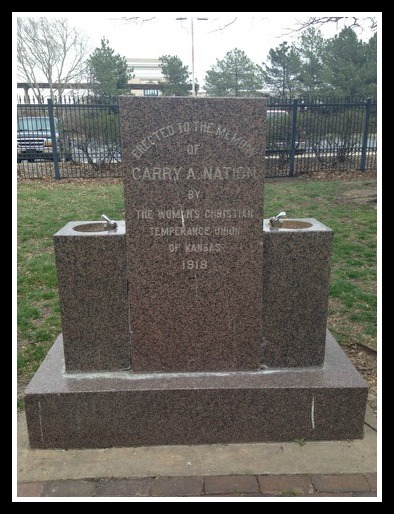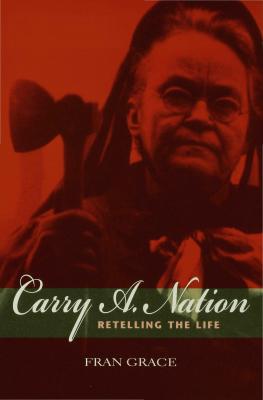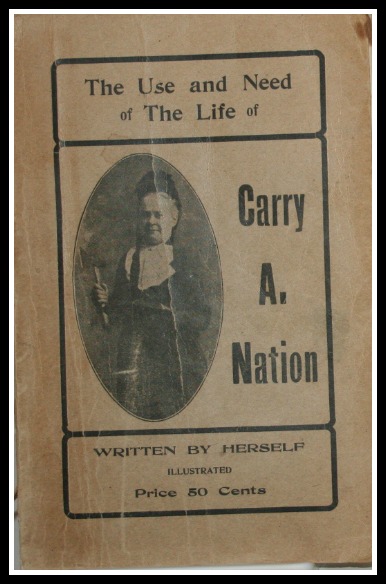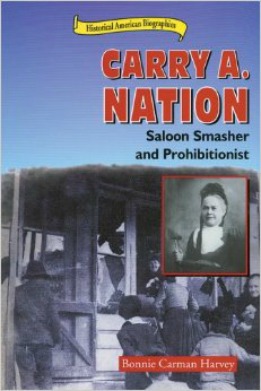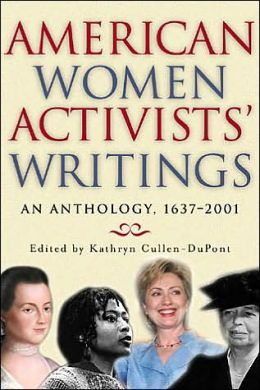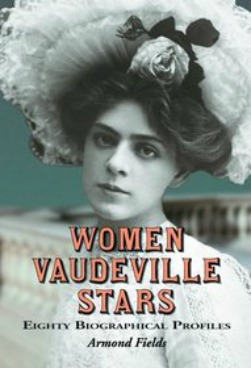Episode 47: Carry ( Carrie ) Nation
Her name is now often a punchline to a joke with the words “nutty” or “crazy” peppered liberally throughout. But in the simplest terms Carry Nation was a woman who boldly worked for reforms which she felt would benefit all mankind. Nothing funny about that.
Born Carrie Amelia Moore in Garrard County Kentucky on November 25, 1846. Her father, George, was fairly well- off plantation owner with a very deep Christian faith. Carry (she later changed the spelling of her name…we go into the whys on the podcast, just didn’t want you to think that was a typo) was very devoted to her father. Her mother…not so much. Mother Mary felt that the best way to raise a child was for Carry to spend as much time with the family’s slaves as possible and essentially farmed young Carry out. (She may also have thought she was Queen Victoria – so getting away from Mom may have been very wise).
As the Civil War began George moved the family (born into and purchased) around, first within Kentucky and then to several farms in Missouri, Texas, Kansas and Arkansas. While the family may have started financially secure, they didn’t remain so and Carry was not raised as a demure belle. There were many years where the family made very little money and scrambled to survive.
Carry’s formal education was very limited- she did read at home from the Bible, and attended a Christian girl’s school in Missouri for a short time. While there she developed a mysterious ailment that sent her back home and into bed for five years pretty much ending her elementary education. During her recuperation time she did spend time in religious study and experienced an epiphany that began a life-long conviction which would be the guiding force for her remaining years.
Carry grew…and grew. During the Civil War the average height of a soldier was 5’8″. Carry was 5′ 11 1/2″ of strong woman who desired nothing more than to find a husband who would love her and whom she could love in return ( it sounds like the basis for a romance novel, doesn’t it?) Her family took in boarders including one Dr. Charles Gloyd (ooh, a doctah!). A surreptitious courtship played out and against her parents wishes, two years later Carry and Charles were married.
Although they had lived under the same roof before, once married Carry discovered her husband’s secret: he liked to drink alcohol. A lot. And he was a mess. Within a year she was pregnant, left him and moved back to her parents home.
Six months after that, Charles died.
Carry was now responsible for a baby as well as Charles’ mother who had depended on Charles and Carry had grown fond of. What’s a strong woman with determination and very little funds to do in such a situation? She went back to school.
Bold, right?
Carry received her teaching certificate and supported her family for four years until she lost her teaching job and found herself in a quandary. Unlike her first solution of pulling herself up by her bootstraps, this time she felt that marriage again was the answer to her problems. Enter- after ten days of prayer for a husband- David Nation. He was 19 years her senior, a lawyer, newspaper editor and minister and within a couple of months they are husband and wife. And daughter from each side and a couple sons from his. And former Mother-in-law. It’s really a very modern story.
Not exactly a happy modern story, the marriage was unpleasant from the start as David and Carry pooled their resources and began to scrap out a living. First cotton farming, then running a hotel but they struggled financially and suffered quite a few hardships (yes, we go into details in the podcast) and eventually the couple was empty nesters and settled in Medicine Lodge, Kansas. It was here that Carry had her first taste of the battle that would give her a place in history.
Throughout her life Carry had made choices based on what she felt was best not just for herself, but for others. She helped those less fortunate as best she could with free beds, food, any kind of assistance she could offer- always using her faith as a guide in her decisions. Because of her giving nature, she encountered many troubled families in need. In Medicine Lodge she became involved with the Women’s Christian Temperance Union and began to believe that the root of many family and societal problems was alcohol. The law in Kansas was on her side with this- at the time it was a dry state, although saloons and “joints”, as she called them, often received a blind eye as they carried on business.
At first, Carry tried to work within the law and work through the proper channels to close down any operating saloons- and was quite unsuccessful. She felt that God lead her to her next action and with the first stone she hurled in a bar in Kiowa, Kansas she launched herself into prohibitionist history.
After a successful run in her own corner of the state, Carry took her activism to Wichita. At that point, she was 54 years old, dressed in black from head to toe- she walked into the then Carey Hotel bar and smashed.
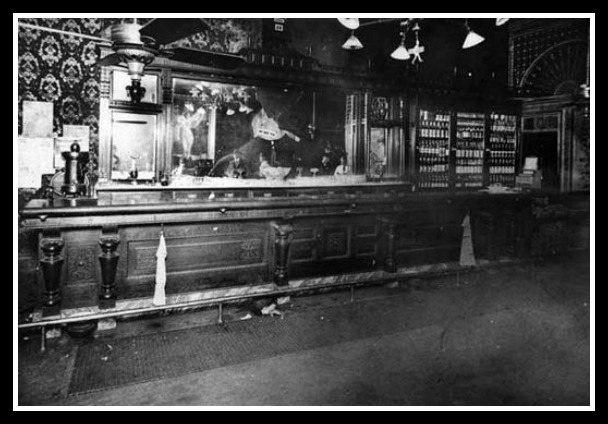
The Carey House Hotel bar after Carry got busy. (Note reflection of poor Cleopatra in broken mirror)
Did she get arrested for her antics? Oh yeah. Did she get followers from the publicity who emotionally, financially and any other ‘ally you can think of supported her? You betcha.
She soon changed her weapon to a small hatchet which was easy to carry and effective for her mission, but also became a marketing tool along with with using her name- Carry A. Nation- to raise funds for her legal defenses.
For years she worked this Smash/Jail pattern which begs to be described as Carry Nation and the Home Defenders: Hatchetnation Tour. She spoke all over the country, joined the Vaudeville circuit and shouted her message from as big a global stage as she could find.
David eventually divorced her on the grounds of desertion, but Carry didn’t seem to mind. She felt that God had put her in a miserable marriage so that she would be driven to do this, her life’s work. Her motives were pure- she believed that curbing the flow of alcohol was the only way to end crime, bring families back together, to end spousal abuse and abandonment- to help women and children.
Prohibition would prove her theory wrong, but she wouldn’t live to see that.
Around 1909 her bloom was beginning to fade. She was turning from motivational powerhouse to object of ridicule so she and her daughter settled down in Host Springs, Arkansas and ran a home for widowed and abused women. In 1911 she collapsed on stage saying, “I have done what I could” and was transferred to a hospital where she died on June 9, 1911 at the age of 64.
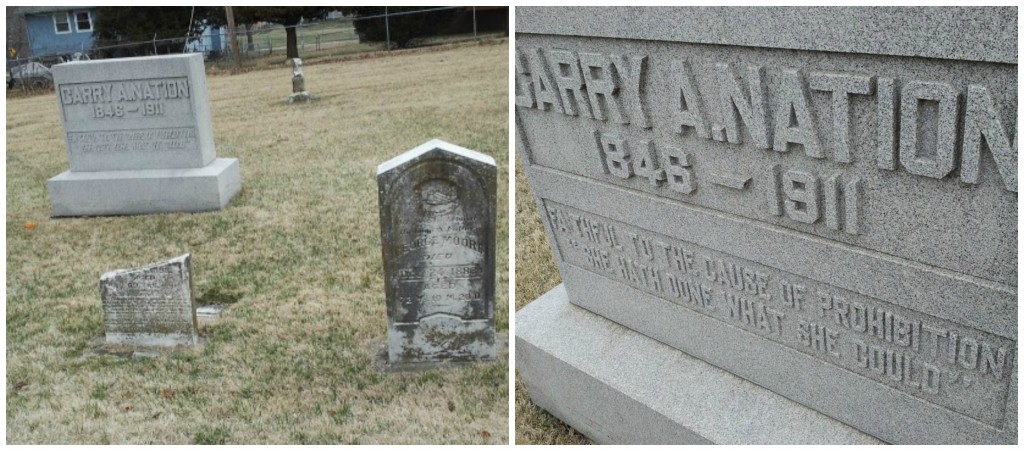
Carry was buried in the family plot in Belton. Missouri. The WCTU erected her headstone using her own words. Susan took these photos- Belton is very close to Kansas City
As part of their efforts throughout the country, the WTCU installed drinking fountains like this one honoring Carry nearby the former Carey Hotel in Wichita.
TIME TRAVEL WITH THE HISTORY CHICKS
Kansas Historical Society has A LOT of documents, artifacts and pictures about Carrie, link will take you to introductory page, but click around for more. And if you find yourself near Belton, Missouri the Belton Historical Society has odd hours, so call before you visit.
If you are headed to Kentucky, The Carrie Nation house, where she was born, is listed on the National Registry of Historic Places, but isn’t open to the public.But don’t despair, the Oscar Getz Museum of Whiskey History is open to the public and Beckett will tell you that it’s worth the visit.
The Carry Nation House in Medicine Lodge, Kansas is open as a museum. This link is to other things you can do to make Medicine Lodge worth the trip. (Not endorsed by us, it’s really a haul from where we are and have never been, but please! Report back if you go!) 9 Things To Do In Medicine Lodge
The Women’s Christian Temperence Union is still an active organization. Link will bring you to their website, although directly to the page of water fountains that we had discussed in the podcast.
Opera fan? Oh, yes there is. SMASHED: The Opera
BOOKS!
This is available online…try Project Gutenberg
Profiles of Carry in both these very interesting and lofty tomes:
Fascinated by Prohibition? Ken Burns six Hour Documentary is available as is this related PBS link, but give these books a try, too.
As always, music come courtesy of Music Alley. Visit them at Musicalley.com

